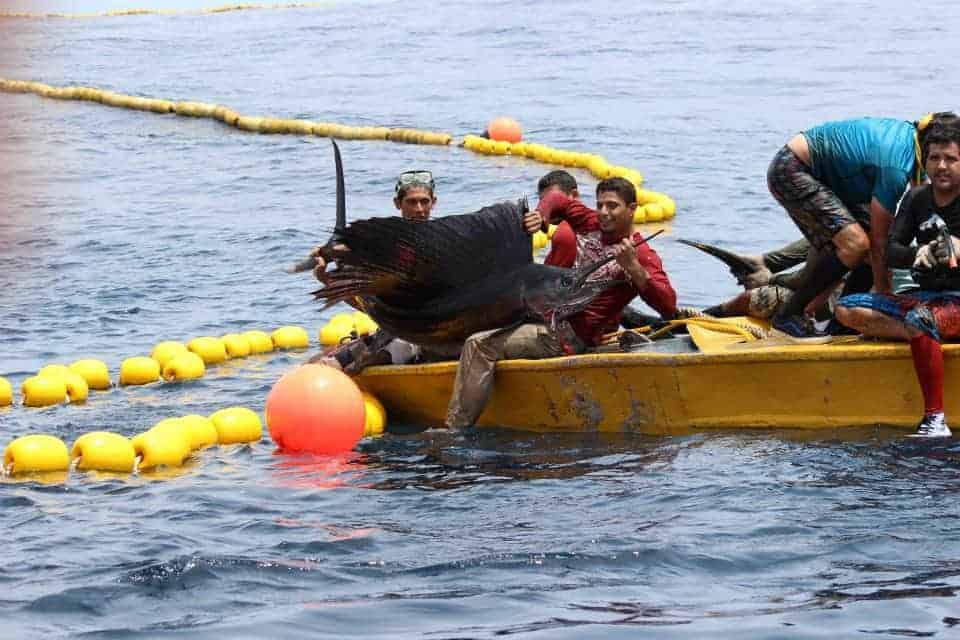Just when we think maybe things might change for the better in Ocean management the sport fishing sector is about to receive another punch in the gut from the government.
The recently passed tuna reform law moved the tuna purse seine off the coast 80 miles. This move will decrease significantly the number of fish taken by the tuna industry as bycatch, especially dorado (mahi mahi) which are the prime target species for Costa Rica’s longline fishing fleet.
The long liners have long said, “If the tuna boats weren’t taking so many of our target fish as bycatch, we would have no interest in sailfish.” Sailfish numbers have decreased for sport fishermen over the last decade as a catch and release species while at the same time commercial landings has increased by as much as 126%.
Now the government is working to reform the “Canasta Basica”, which is a list of products for consumers that will only be taxed at 1% for the benefit of consumers. Of the nearly 200 food and household products being considered for tax discount, there are 21 seafood items.
Some of the seafood items are: fish heads, fillet of pangasius (an imported catfish), grunt fillets, Thresher shark fillets, and tilapia fillets. Also included are whole fish purchases of second grade yellowfin tuna, catfish, tripletail, bonito, grouper, barracuda, mackerel, jack, mullet, sardines, and tilapia. Also on the list is SAILFISH fillets.
It is obvious that this list was put together with input from the fishing industry and exporters. Nearly all items on the list have much of a value to the industry and very little value to exporters.
The list of goods is being reviewed by the Ministro de Hacienda (taxes), the Ministro de Economia (economy) and the Ministra de Salud (health). They are receiving public comments on the list of goods until October 11 before making their final decision. Hacienda, despachomh@hacienda.go.cr, Nogui Acosta Jaen, Economía despachoministro@meic.go.cr, Francisco Gamboa Soto, and Salud joselyn.chacon@misalud.go.cr
Reasons why sailfish should be removed from “canasta basica”
According to article 76 of the Costa Rican fishing law sailfish is declared a species of tourist interest and regulatory measures have been put in place to protect their abundance. Direct targeting of sailfish by commercial fishermen is prohibited, any fish alive on the commercial line must be released, and a 15% incidental mortality is in place of a long liners total catch which can be sold on the National market.
This loophole opens the door for the sailfish to be exploited because if it can be sold, it comes to the dock. Even so landing records show only 3% of the long liners catch is sailfish. Still, that is over 100,000 dead sailfish since 2015. All sailfish caught by sport anglers must be released.
Economically
Sailfish is a great generator of income for Costa Rica. It is the most sought-after species by tourists bringing 13% of all tourist dollars coming into the country. Most of the over $500 million annually does not go directly to the industry.
A major portion is shared with hotels, restaurants, in country transportation and other tour operators as the tourists that come mainly to fish also do other activities. Many also invest in real estate such as condos or houses in or near marinas generating a tax base for the government.
Health
It is a known fact that sailfish is not one of the best choices to be consumed by small children or the elderly. There are much healthier options.
Fairness
Sportfishing has never been treated fairly. There are 623 boats with tourist or sport fishing licenses and 2218 with commercial licenses according to Incopesca records (August 2022). Even though the commercial fleet is 3 ½ times larger than the tourist and recreational fleet, the sport fishers contribute 75% of revenue collected for boat and individual fishing licenses going into government coffers.
It is often said that one can does not control what takes the bait the miles of line placed in the ocean. But one can control what happens to it afterward. The incidental catch rule for sailfish is an incentive to kill them.
Other protected species like turtles die on longlines and are not allowed to be sold. If one considers it a waste to not utilize a dead sailfish, rather than profit from it, require to be donated to government food banks to be distributed to the poor. The incentive to profit must be removed to achieve real conservation.
We need to let these ministers know it is a bad idea to include sailfish in the list. A simple little note is all that is needed. This not only helps the species from going into decline, but also helps the many working in the tourism trade and not just fishermen. If you have a boat here or a tourism operation but are not a citizen surely your employees are. Encourage them to send a note to the above ministers.
About the Author
Todd Staley has run sport fishing operations in Costa Rica for nearly 30 years and works in marine conservation. He currently is Communications Director at FECOP, the Costa Rican Fishing Federation (www.fecop.org), serves on the International Game Fish Association’s Central America Council. Contact him at wetline@hotmail.com






